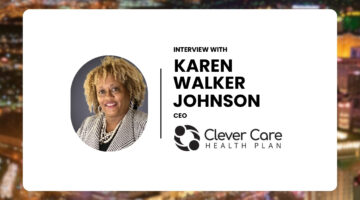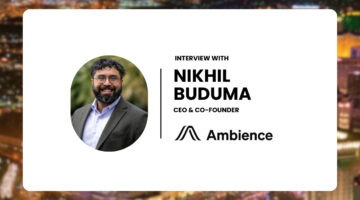[youtube http://www.youtube.com/watch?v=jHYtYdAQ8bg]

The Future of Healthcare: Why Language & Culture are Key to Better Medicare
Clever Care CEO discussed the importance of culturally-competent care.
Also, here are five noteworthy MedCity News stories from the past week:
1. Tim Cook hints that Apple could make a medical device, but it won’t be the Watch
In an interview yesterday with The Telegraph, Cook made it clear that any presumptions about future Apple Watches containing medical sensors beyond things like fitness trackers and heart rate monitors won’t be happening because the company doesn’t want to go through the process of Food and Drug Administration testing with the Watch. He said doing that would slow down its release cycle and “hold [Apple] back from innovating.”
2. Why patient-generated health data is critical to the process of care

Ambience CEO on Personalizing the Physician Workflow
CEO shares how Ambience can help reduce administrative burden.
While some providers fear the volume of data generated by patients outside of office visits, others are demonstrating how it can be integrated into clinical workflow through tools like Apple HealthKit and integration companies like Validic.
But on a personal level, is there benefit for the patient in generating data? Kristina Sheridan experienced this reality when her daughter experienced complications from Lyme Disease. As her daughter deteriorated and went to multiple specialists, Kristina began tracking symptoms and other data on a daily basis, resorting to spreadsheets and also calculating a disease burden score based on her daughter’s suffering.
3. WebMD will compete with physician social networks with new Medscape virtual consult app
WebMD took a page from social networks aimed at physicians and launched what it calls a virtual curbside consult for its Medscape channel. It wants to provide a way for physicians to share insights and collaborate on cases with peers around the world but also tap into its content at the same time. It expects to roll out the desktop version of the Medscape Consult app early next year.
4. Lark CEO on inserting compassion into artificial intelligence app for healthcare
When it comes to retaining users for health-driven applications, there’s a simple tool for success: “Remember customers deserve understanding, health and love, said Lark CEOJulia Hu during a talk at this week’s Exponential Medicine conference in San Diego.
Lark is a mobile health company that’s built out an artificial intelligence platform that serves as a personal nutritionist and weight loss coach – providing encouragement and tips with a humanized interface.
5. Health literacy startup wants to redefine personalized videos to improve adherence
Israeli digital health startup Telesofia Medical has set out to be as specific as possible when it comes to developing personalized video content for health literacy program. Many of its customers are big pharma companies but some are health systems keen to prepare patients for an upcoming procedure or help patients follow a care plan when they are diagnosed with a condition or discharged from the hospital.






